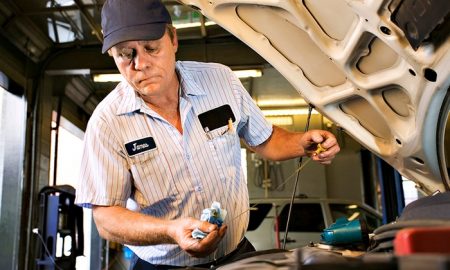Brakes2Go: $30 for One Conventional or $64 for One Full Synthetic Oil Change and One Optional Brake Inspection (Up to 50% Off)
Today’s Groupon Toronto Daily Deal of the Day: Brakes2Go: $30 for One Conventional or $64 for One Full Synthetic Oil Change and One Optional Brake Inspection (Up to 50% Off)
Buy now from only $64
Value $99
Discount 35% Off
Highlights
Professional automotive technicians offer a variety of services, ensuring that customer’s car runs smoothly and efficiently
What You’ll Get
Choice of:
- One Conventional Oil Change for Asian or Domestic Car
- One Full Synthetic Oil Change for Asian or Domestic Car
- Brake Inspection
This deal is a very hot seller. Groupon has already sold over 300+ vouchers at the time of this post.
This is a limited time offer while quantities last so don’t miss out!
Click here to buy now or for more info about the deal.
The Fine Print
Promotional value expires 120 days after purchase. Amount paid never expires. Valid for up to 6 liters of oil. Extra charge applies for vehicles requiring more than 6 liters of oil. Additional fee for oil disposal. Washer fluid top off included. Offer is not valid for European cars; please call for pricing on European car service. Appointment required. Limit 1 per person, may buy 2 additional as gift(s). Must use promotional value in 1 visit(s). Valid only for option purchased. All goods or services must be used by the same person. Merchant’s standard cancellation policy applies (any fees not to exceed voucher price). Merchant is solely responsible to purchasers for the care and quality of the advertised goods and services.
Brakes2Go
http://www.brakes2go.ca/
1019 Nelson Street, Oshawa, ON L1H 7N9
(905) 434-7019
Antifreeze: Keeping Cars Cold-Blooded
Techs will top off of your car’s fluids, including antifreeze. Check out our guide to find out how this elixir keeps your car from sweating.
An engine’s rapidly moving parts generate a lot of heat, and while water is extremely effective at keeping things cool, two things make it a poor choice inside a radiator. For one, it can cause the metal to rust and corrode or leave dangerous mineral deposits inside the tank. More importantly, though, water freezes—fast. In older cars, drivers would often fill their radiators with regular tap water, rendering them useless in the winter months or on summer camping trips in Siberia.
To overcome these shortcomings, modern coolant contains a variety of ingredients to prevent corrosion and change the freezing point of water—lending it the more popular name of antifreeze. When mixed with a solution of about 30% ethylene-glycol antifreeze, water doesn’t freeze until it’s nearly 0 degrees Fahrenheit—and doesn’t boil until it reaches about 220, allowing the engine to safely get hotter than usual. The mixture must be just right, however, since once the coolant becomes too diluted (anything over about 70%), the freezing point starts to creep back up.
Finding the right chemical base for antifreeze is an ongoing struggle. Almost all formulas use some kind of alcohol, whose freezing point is around 206 degrees lower than water’s. Early antifreeze used methanol, but its low boiling point made it ultimately impractical, so most formulas today are based on propylene glycol or ethylene glycol. Though cheaper to produce, the latter comes with a greater cost: it’s extremely toxic, a danger exacerbated by its sweet, syrupy taste. Some manufacturers have helped protect children and pets by adding a bittering agent to the formula, giving it the same foul taste of broccoli found in other poisons.
Click here to buy now or for more information about the deal. Don’t miss out!

